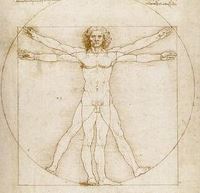Man
Man will be often written with a capital M for two reasons. The first is his unique position amongst all the creatures of creation. We shall examine why and what that means in this philosophy. Man with a capital M also indicates Women and Men without gender distinction to simplify writing.
Ex.-
When you will see this abbreviated word, example, it will indicate that we can find numerous examples which demonstrate the expressed concept. We shall give an example or two for the tone and method. The reader can then find other examples if he wants to verify the assertions which they illustrate. We shall see that all truth has numerous ramifications.
Primordial Intelligence
In any philosophy there is interrogation on the nature of Man, his origins and the reason for his existence. These questions will inevitably bring us to address the existence, or not, of God, or rather within the framework of this philosophy, the Primordial Intelligence which would have created the world. The term God has been overused and has many connotations that are not neutral. Some people think that their God is different from others peoples, which is contrary to universal thought. If a universal intelligence has created the universe, it has applied the same laws to all the universe. This is coherent with the discoveries of science, mystics and shamans of the world. So, we choose to give another name, more universal than God and choose for this this philosophy that of Primordial Intelligence.
To compliment the prose we shall sometimes give the name Creator, Great Spirit, Great Mystery or Superior Power to the Primordial Intelligence.
Religion and Spirituality
Since we speak of Primordial Intelligence it is also necessary to speak about spirituality and religion. It’s important to make the distinction between religion and spirituality. We consider that the institutionalized religions of the world (Buddhism, Christianism, Islamism, Hinduism and other major religions) are dogmatic. That’s to say that they teach a doctrine which is not subject to discussion but which must be accepted as such by the members of these religions. Spirituality on the other hand indicates a belief system which is free of dogma. It’s to say that every person defines his relation with the Primordial Intelligence and does not answer to an outside authority which would dictate what to think of his spirituality.
As such, shamanism which is universal amongst all aboriginal nations of the world can enlighten us on spirituality. After numerous meetings with shamans of the five continents I have found that in spite of a huge disparity of ways, techniques, traditions and shamanic abilities they all share the same basic spiritual philosophy. All communicate with immaterial spirits, all respect the earth and nature and all honor their ancestors and traditions of their nation. All shamans accept all religions but generally adhere to none. Health and healing are considered to be fine tuning, a harmonization with the laws of nature and the universe and the role of the shaman is to favor this harmonization and this union. All also teach the liberty every Man has to enter into a personal privileged relationship with the Great Mystery. The shaman does not claim to have any particular privileges others than the respect due to any Man who is a guardian of tradition and healer for his community. This is an important difference with the hierarchical structures of religions where the pope, llamas, bishops, imams, rabbis and other notables of the religious hierarchies receive particular consideration and authority which often places them above the populations which they serve. So, we can define shamanism as a spirituality rather than a religion.

